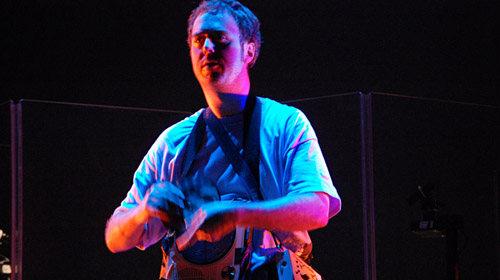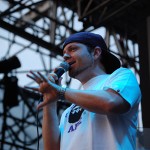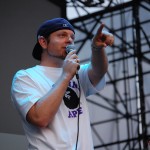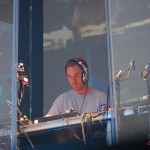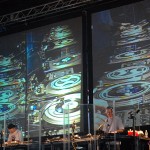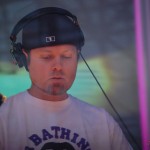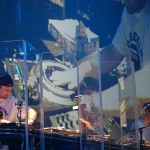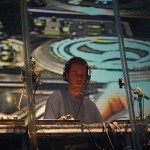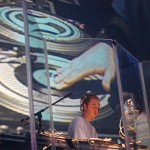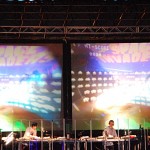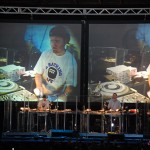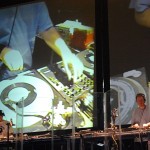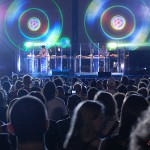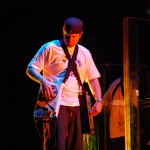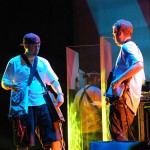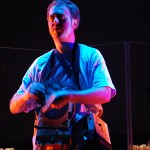It all started with a phone call (or, in this case, a text message) . . . “would you want to do Freeze at the Hollywood Bowl?” Cut Chemist and DJ Shadow jumped at the chance to be the first-ever headlining turntablists at the legendary 16,500 capacity venue, the site of infamous concerts by everyone from John Williams to the Beatles to the Doors. In the process of preparing for the June 2007 show, Shadow and Cut recorded their rehearsals, allowing for this latest and greatest episode in all-45 mayhem. As with ‘Freeze’ and ‘Product Placement’, the emphasis is on the eclectic; funk and hip hop are present as is some rock. But ‘Hard Sell’ is leaps and bounds beyond the expected, on a musical basis, as well as technical. Now utilizing eight turntables and two loop pedals, plus four mixers and a fat stack of 7-inch vinyl, new possibilities in live mixing are explored, as doo-wop mixes with punk, new wave with grime, and everything in between, all with taste and humour. Several classic hip hop tracks are even “sampled” (via loop pedal) and reconstructed in real time, from their original elements. Now you can finally hear what all of the buzz has been about. Forget mash-ups, forget computers, and never mind the MP3s: this is real turntablism at its genrebending, skills-dominated best. The ‘Hard Sell’ CD comes in a beautifully designed, die-cut DVD style case, with art by Paul Insect.
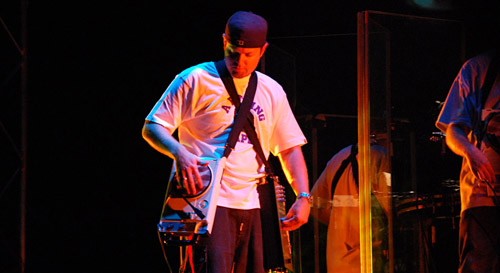
The record was put together from disparate elements over nearly three years. Artifact (Instrumental) is a relic of Shadow’s work on an abandoned solo LP by former Rage Against The Machine front man Zack De La Rocha. 3 Freaks, which features the hyphy emcees Keak Da Sneak and Turf Talk, was the impetuous, inspired result of Shadow’s love-at-first-listen affair with the Bay’s answer to crunk. Seein’ Thangs, featuring Mississippi’s finest, David Banner, was supposed to include a rap by Mystikal, but he was in prison: so was Shadow’s second choice, Pastor Troy. By the time Davis went back to Banner to ask him to add a second verse, Katrina had devastated America’s southern shores, a disaster that couldn’t help but colour Banner’s rap. Kasabian’s Sergio Pizzorno and Christopher Karloff were introduced to Shadow by his engineer, and The Tiger was the standout result. And even Bay Area icon E-40 is in there, rapping about “the legendary DJ Shadow”, suggesting that this Outsider really is anything but. The key to understanding how all these different voices and inspirations are able to coexist on the same record is to remember that Shadow is as much a fan as a musician. Outside the records he has contributed to as a recording artist, he has built an enviable rep as a mixtape DJ and curator of an idiosyncratic musical archive. The all-45 mixes Brainfreeze and Product Placement, with his friend and fellow producer-DJ Cut Chemist, revolutionised the art of funk DJ-ing and had a massive impact on the obsessive world of funk collecting, while his Schoolhouse Funk compilations have rescued some amazing slices of that most elusive of musical genres – high school marching band funk – from history’s trash can (or, at least, America’s thrift stores). But in the studio he has often felt constrained by the massive expectations that came after the release of his first album, and the incredibly devoted cult fandom that was attracted to it. Since he took his enviable talent and magpie ear for musical jewels overground with the release of the acclaimed debut album Endtroducing… in 1996, Shadow has probably spent more time than he cares to admit being what other people want him to be. In cahoots with his first patron and early mentor, Mo’ Wax label boss and fellow DJ James Lavelle, he made the lion’s share of the music on the 1998 U.N.K.L.E. album, Psyence Fiction. By the time he released The Private Press, he had taken his chosen musical metier – emotive instrumental music, created entirely from samples – as far as it could go. From the haunting Giving Up The Ghost to Monosyllabik’s obsessive methodology (the entire track was created by stretching, treating and manipulating samples from one funk single, in a process akin to aural stop-frame animation), it was the ultimate Shadow LP.
Though all these endeavours, though, Shadow remained the starry-eyed rap fan who’d been introduced to hip hop as a teen by the college radio station in the Californian town he grew up in and with which he shares a surname. On the sleeve of Endtroducing…, he explained the record as being the product of “a lifetime of vinyl culture”, and The Private Press might as well have carried the same epithet. Yet they have only been able to tell half of the story: and The Outsider – a record titled because that’s how Davis sees himself, in relation to the music business, to the hardcore rap he has always loved but which his fans erroneously presume he sets himself above – is about filling in some blanks. Two things happened to change Shadow and his music. The first was the discovery that, when his wife found she was expecting twins in 2003, her pregnancy turned out to be monoamniotic. This rare condition – “you’re four times more likely to be struck by lightning,” he says – means that twins develop in the same sac in the womb. The couple now have two healthy daughters, but only after months of torment during which most medical wisdom suggested that not only the children, but the mother, were unlikely to survive. Then, while in London working on The Outsider, Shadow was being driven to his hotel after a late night recording session when his cab driver fell asleep at the wheel and ran a red light. The minicab hit a people-carrier broadside: no-one was seriously injured, but had they arrived at the junction a split second earlier, Davis would almost certainly have been killed. “Those two things blew my mind,” he says, “and I can’t go back. It was like a light switch being flicked. I guess I was an eternal 23-year-old for seven years, and when it all went down I became a man. Sometimes I think it would have made me take less risks, and be more demure and thankful and calm, but it actually made me wanna take a stand on everything. After all that, I realised, not only is life too short, but it could end at any time, so I really can only do what I really want to do. That’s when I went home and made Three Freaks. And I suddenly felt very confident in the direction I wanted to go.” It’s a confidence that certainly hasn’t been misplaced, and those life-changing lessons have been most assuredly learned. By abandoning himself once and for all to the instincts of his inner fan, Shadow has made the record that best represents who he is and what he wants to be, and that shows, to borrow a phrase from another hip hop pioneer, both where he’s from, and where he’s at.
